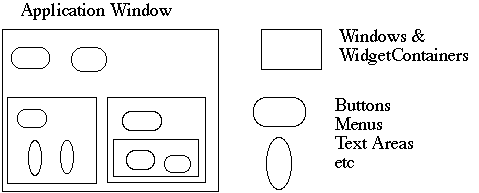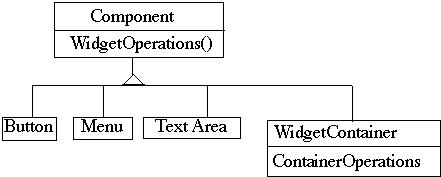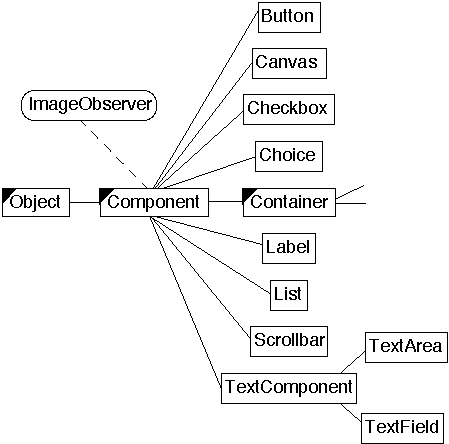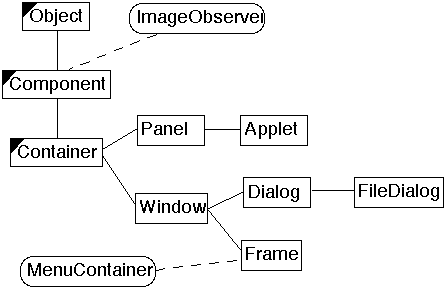
 |
CS 635: Advanced Object-Oriented Design & Programming |
|---|
| Reference | slide # 1 |
| Composite | slide # 2 |
| ...Example - Motivation | slide # 2 |
| ...Issue: WidgetContainer Operations | slide # 6 |
| ...Explicit Parent References | slide # 7 |
| ...Applicability | slide # 8 |
| ...Java Use of Composite - AWT Widgets | slide # 9 |

Widgets are different that WidgetContainers
class Window
{
Buttons[] myButtons;
Menus[] myMenus;
TextAreas[] myTextAreas;
WidgetContainer[] myContainers;
public void update()
{
if ( myButtons != null )
for ( int k = 0; k < myButtons.length(); k++ )
myButtons[k].refresh();
if ( myMenus != null )
for ( int k = 0; k < myMenus.length(); k++ )
myMenus[k].display();
if ( myTextAreas != null )
for ( int k = 0; k < myButtons.length(); k++ )
myTextAreas[k].refresh();
if ( myContainers != null )
for ( int k = 0; k < myContainers.length(); k++ )
myContainers[k].updateElements();
etc.
}
public void fooOperation()
{
if ( blah ) etc.
if ( blah ) etc.
}
}
A Better Idea - Program to an interface
class Window
{
GUIWidgets[] myWidgets;
WidgetContainer[] myContainers;
public void update()
{
if ( myWidgets != null )
for ( int k = 0; k < myWidgets.length(); k++ )
myWidgets[k].update();
if ( myContainers != null )
for ( int k = 0; k < myContainers.length(); k++ )
myContainers[k].updateElements();
etc.
}
}

Button, Menu, etc overrides Component methods when needed
WidgetContainer will have to overrides all widgetOperations
class WidgetContainer
{
Component[] myComponents;
public void update()
{
if ( myComponents != null )
for ( int k = 0; k < myComponents.length(); k++ )
myComponents[k].update();
}
}WidgetContainer operations tend to relate to adding, deleting and managing widgets
Should the WidgetContainer operations be declared in Component?
All subclasses can be treated alike. (?)
Declaring them in WidgetContainer is safer
Adding or removing widgets to non-WidgetContainers is an error
What should be the proper response to added a TextArea to a button? throw an exception?
One out is to check the type of the object before using a WidgetContainer operation
class WidgetContainer
{
Component[] myComponents;
public void update()
{
if ( myComponents != null )
for ( int k = 0; k < myComponents.length(); k++ )
myComponents[k].update();
}
public add( Component aComponent )
{
myComponents.append( aComponent );
aComponent.setParent( this );
}
}
class Button extends Component
{
private Component parent;
public void setParent( Component myParent)
{
parent = myParent;
}
etc.
}
Who should delete components -

